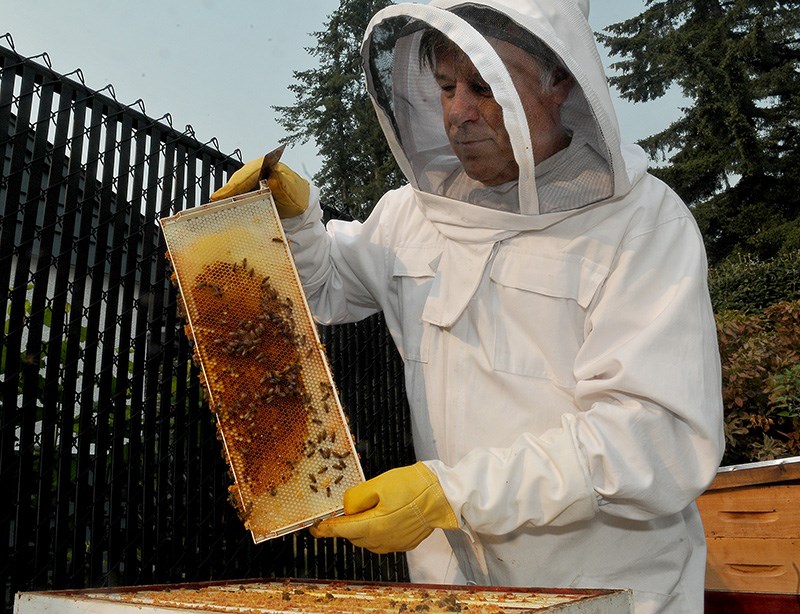Five years ago Ron Aarstad didn’t notice many bees in his Coquitlam neighbourhood. Now there’s a buzz and his fridge is overflowing with fruits and vegetables brought to him by neighbours grateful for the contribution his two hives have made to their bountiful gardens.
Aarstad, 56, said he was aware of the plight of bees around the world as they struggle to survive against pesticides, disease and mites. He flirted with the idea of raising some himself for years to try to help in his own small way. But it was only after a friend signed them up for beekeeping school in Tsawwassen his curiosity took root.
That was four years ago and the four-foot tube of about 8,000 bees and a queen bee Aarstad ordered from New Zealand to get started on his new hobby has increased to two hives that are home to tens of thousands of buzzing bees flitting back and forth throughout the neighbourhood, pollenating plants and flowers as far as five kilometres away.
The hives are tucked away in a gravelled corner of the yard behind Aarstad’s home near Como Lake Avenue and save for the occasional buzz of excitement when an interloper disturbs the wooden structures, it’s hard to notice they’re even there.
But the bright blossoms all around are evidence of their diligence and hard work. As are the 160 or so jars of honey Aarstad’s neighbours will line up for at his front door when word gets out he’s harvesting his hives.
Aarstad said as far as hobbies go, beekeeping can be pretty low-maintenance. After an initial investment of $500—$1,000 to acquire the bees, hives, a protective beekeeping suit and a smoker that is used to calm the bees when accessing the hives, bees are pretty self-sustaining. He said the busiest time is the fall, when he prepares the bees for winter by setting up a feeder for them to fatten up on a mixture of sugar and water, and wraps the hives in building paper to keep cold wind out. In the spring he also has to split the hive and try to establish a new queen to prevent his bees from swarming.
But other than that, Aarstad said, his bees require just a low level of ongoing vigilance to ensure they’re healthy, their combs are orderly and predators like wasps or skunks can’t get into the hives.
Mostly, he just watches and learns.
“They’re very intelligent,” Aarstad said. “They have strict rules in the hive. Things happen in order, and they happen for a reason.. Everybody does what they’re supposed to do.”
Martin Dale, a beekeeper for more than four decades, said the teachings of bees are never-ending. So much so, he acknowledges he can only scratch the surface at an introductory workshop he’ll be giving at the Mossom Creek fish hatchery on Sunday, Aug. 26, from 1:30 to 2:30 p.m.
Dale, who recently earned his Master Beekeeper certification from the BC Ministry of Agriculture and the University of British Columbia, said it’s important we heed the bees’ lessons.
“They can do so much stuff, it’s phenomenal,” he said. “But there’s so many things going against the bees right now.”
And that’s where beekeepers can help. By providing a safe, healthy habitat and monitoring their bees for signs of disease or parasites, they ensure a robust population of pollenators that will literally help plants bear fruit.
Aarstad said keeping bees in his backyard has sparked numerous conversations with friends and neighbours.
“There is more interest,” he said. “People are understanding we have to make changes to help these very important creatures.”
And the bees are only too happy to reciprocate with a constant flow of honey that can be used for everything from sweetening toast to soothing a sore throat to even alleviating allergies. It’s not a bad deal, Aarstad said.
“It’s just fun. I get to play with bugs.”
• For more information about Martin Dale’s free beekeeping workshop that is open to all ages, go to www.mossomcreek.org/salmon-sunday-speaker-series/.



